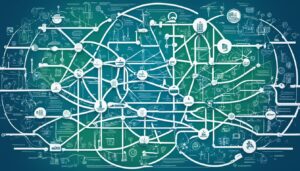Have you ever wondered how a single opportunity for education could change the lives of millions living in poverty?
Education is more than learning facts. It’s a key that unlocks the chains of poverty for many families. Studies show that basic reading skills can lift 171 million people out of extreme poverty. This proves how crucial education is in improving lives and communities.
But there’s more to it than numbers. Education lowers poverty by empowering women, creating healthier families, and boosting economic growth. Finishing secondary school could cut global poverty by more than half. This shows every step in education moves us towards a more stable economy.
Education opens doors to better jobs and health. It’s central to fighting poverty effectively. Think about how education changes lives and strengthens whole communities.
Key Takeaways
- 171 million people could escape extreme poverty if all students had basic reading skills.
- Completion of secondary education can cut the global poverty rate by over half.
- 75% of GDP growth from 1960 to 2000 is attributed to increased math and science skills.
- Educated women tend to have fewer children and healthier pregnancy outcomes.
- Keeping girls in school may significantly reduce their risk of contracting HIV.
- Education fosters disaster preparedness and increases community resilience.
- Every additional year of secondary education reduces child marriage chances.
Understanding the Link Between Education and Poverty Reduction
Education is key in fighting poverty. It helps people grow personally and across society. Today, millions of kids live on less than $1.90 a day. Thus, it’s crucial to fix educational gaps now. Education and less poverty lead to better jobs and living conditions.
Education as a Tool for Economic Growth
Putting money into education boosts the economy. Studies find that more schooling can raise income by up to 10% for each year. This shows how vital education is in beating poverty. People with more education earn more and help their community’s economy grow.
Educational Attainment and Employment Opportunities
Getting a good education is key to finding jobs. Those without a diploma often earn less and face joblessness. Education is critical for getting out of poverty. Early education sets the stage for success later in life. It also helps girls delay marriage and having children, which improves economic situations over time.
How Education Affects Poverty
Education can transform communities, offering a way out of poverty. It empowers individuals with knowledge and the drive to lead. Such empowerment sparks positive change and initiates growth. The UIS/GEM Report shows that secondary education could lift 420 million people out of poverty.
Breaking the Cycle: The Role of Education in Empowering Communities
Education plays a crucial role in stopping the cycle of poverty. It opens up chances for economic growth and leadership roles. This is especially true for women, leading to lower early pregnancy rates and healthier families. For example, primary education for all girls in certain regions could reduce early pregnancies by 10%.
These benefits reach beyond the individual to strengthen entire communities through improved health and social conditions.
Improving Health and Social Outcomes
Education leads to better health and social well-being. It teaches important health and nutrition knowledge, empowering people to live healthier lives. Women, in particular, can use literacy to access health information and reduce risks. Through education, communities learn to prevent diseases, improving the overall health in areas struck by poverty. Learn more about these benefits here.

Education also increases food security with better farming methods and promotes gender equity. Investing in education yields vast earnings and health advantages, especially for girls. It improves life quality and independence. The impact of education on poverty highlights the need for ongoing investment in this field.
Conclusion
Education has a strong role in fighting poverty. Many studies show it boosts economic growth and increases job chances. It also betters health and social outcomes. By tackling systemic barriers and ensuring all have access to good education, we can support sustainable development and reduce poverty. Knowing how education impacts poverty helps us uplift communities.
Sites like ZNotes are key in helping students from low-income families. They give access to technology and community-based learning. This helps youth gain important skills and feel part of the global community. Education is seen as a way to lessen poverty by fighting inequalities. It helps stop poverty from continuing.
Think about how important education is. It’s a message to those making policies to put money into educational systems and support. By doing so, we can improve how education affects poverty worldwide. We need to make sure everyone has the chance for a good education. This gives every child the chance to do well in a caring environment. Check out more on education’s powerful role in fighting poverty.



